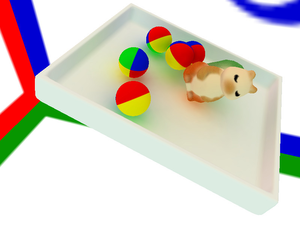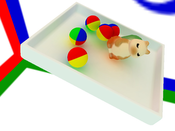Information
- Publication Type: Master Thesis
- Workgroup(s)/Project(s):
- Date: October 2007
- TU Wien Library:
- First Supervisor: Stefan Jeschke
- Keywords: precomputed radiance transfer, indirect illumination, global illumination
Abstract
This thesis describes a method for approximative soft shadows and diffuse reflections in dynamic scenes, based on a method by Ren et al. [32]. An overview of precomputed radiance transfer and spherical harmonics is also presented, as well as a short introduction to global illumination. The proposed method uses a low-order spherical harmonics basis to represent incident radiance and visibility on the hemisphere of a receiver point. Diffuse reflecting geometry and shadow casting geometry is represented as sets of spheres. The spheres of an object approximate its shape and diffuse surface color as seen from any viewpoint. In a first pass, the direct illumination of an object is projected to its spheres and stored along with an approximation of the diffuse surface color as SH vectors defined over the surface of each sphere. In a second pass, the average color and the visibility for each sphere at a receiver point is found. The product of average color and visibility is used to approximate the incident radiance from diffuse reflections. Using a sphere set approximation instead of actual geometry for both soft shadows and diffuse reflections allows us to compute the visibility and diffuse reflections of an object on the fly at runtime. This text also describes a GPU implementation of the method and discusses obtained results. Interactive performance with relatively smooth framerates of over 20 fps is achieved for moderately complex scenes.Additional Files and Images
Weblinks
No further information available.BibTeX
@mastersthesis{guerrero-2008-dip,
title = "Approximative Real-time Soft Shadows and Diffuse Reflections
in Dynamic Scenes",
author = "Paul Guerrero",
year = "2007",
abstract = "This thesis describes a method for approximative soft
shadows and diffuse reflections in dynamic scenes, based on
a method by Ren et al. [32]. An overview of precomputed
radiance transfer and spherical harmonics is also presented,
as well as a short introduction to global illumination. The
proposed method uses a low-order spherical harmonics basis
to represent incident radiance and visibility on the
hemisphere of a receiver point. Diffuse reflecting geometry
and shadow casting geometry is represented as sets of
spheres. The spheres of an object approximate its shape and
diffuse surface color as seen from any viewpoint. In a first
pass, the direct illumination of an object is projected to
its spheres and stored along with an approximation of the
diffuse surface color as SH vectors defined over the surface
of each sphere. In a second pass, the average color and the
visibility for each sphere at a receiver point is found. The
product of average color and visibility is used to
approximate the incident radiance from diffuse reflections.
Using a sphere set approximation instead of actual geometry
for both soft shadows and diffuse reflections allows us to
compute the visibility and diffuse reflections of an object
on the fly at runtime. This text also describes a GPU
implementation of the method and discusses obtained results.
Interactive performance with relatively smooth framerates of
over 20 fps is achieved for moderately complex scenes.",
month = oct,
address = "Favoritenstrasse 9-11/E193-02, A-1040 Vienna, Austria",
school = "Institute of Computer Graphics and Algorithms, Vienna
University of Technology ",
keywords = "precomputed radiance transfer, indirect illumination, global
illumination",
URL = "https://www.cg.tuwien.ac.at/research/publications/2007/guerrero-2008-dip/",
}

 thesis
thesis
